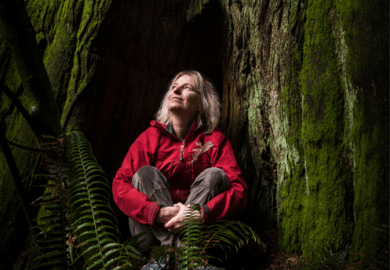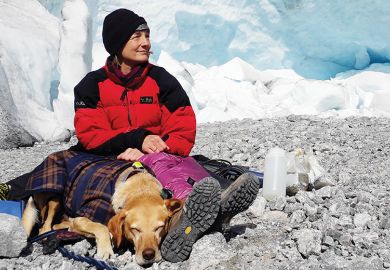Volcanoes are a gift to the storyteller. Many of them are impressive landscape features, all are spectacular when they erupt, and some cause widespread death and destruction. The largest eruptions even get blamed for climate change and mass extinctions. No wonder that there is an endless stream of volcano documentaries in television science-and-nature slots, and even a few Hollywood movies starring an erupting volcano. The public just can't get enough of these magic mountains.
Here are two volcano books sufficiently accessible to appeal to the enthusiast and yet with enough meat in them to satisfy university students.
Volcanoes is the second edition of the much-admired Volcanoes: A Planetary Perspective (1993) by the late Peter Francis. Clive Oppenheimer (a former student of Francis) has given the text a thorough overhaul and has updated it with references to significant eruptions and scientific developments.
There are new chapters on volcano monitoring and reducing volcanic risk.
But large areas of the original text have been left alone, with some deft reordering. Oppenheimer shares Francis' wry outlook, and this comes through in the seamlessness of his interpolations.
Most of the frequent illustrations are photographs, but there are line drawings and graphs. Although the photographs are mostly of high quality, it is disappointing in a book of this price to find none in colour.
Oppenheimer does not shy away from difficult concepts, and as part of a more modern treatment of magma vesiculation (bubble formation) he presents a skilful précis of Yuri Slezin's catastrophe theory model, whereby a slight change in the pressure driving magma up a conduit can trigger an enormous change in magma ascent velocity. This can transform a gentle effusive eruption into a devastatingly explosive eruption in the twinkling of an eye.
Occasionally, the updating disappoints. For example, although Oppenheimer has thoroughly revised the discussion of volcanism on Jupiter's satellite Io in the light of wonderful images and thermal data collected by the Galileo probe, the description of cryovolcanic processes on Europa remains as it was in the first edition despite equally great advances in our understanding.
Volcanism is based on the second edition of Volkanismus , published in German in 2000 and now translated into near-flawless English by the author Hans-Ulrich Schmincke, who took the opportunity to update the text. It is even more copiously illustrated than Volcanoes , with the added bonus that almost everything is in glorious colour. My enjoyment of Schmincke's noble attempt in a three-dimensional perspective sketch to explain the relationships between local plate boundaries and the southern Italian volcanoes was marred by its inconsistency with the adjacent map that shows Mount Etna on a different plate.
A reader of Volcanoes who does not know better could be excused for reaching the end happy in the assumption that melting of rocks is usually achieved by an addition of heat. Volcanism does a better job of explaining how magmas are generated. The more common mechanisms (decompression and addition of volatiles) are in Volcanoes , but you have to work hard to piece the story together. On the other hand, Volcanism says virtually nothing about extraterrestrial volcanoes, and what it does say (Io is "a moon of the planet Venus") is wrong.
There is little to choose between these two books as serious introductions to volcanology. Both include numerous references to the professional literature. Volcanoes suggests some useful websites, but Volcanism includes a glossary. For a good read, the former definitely has the edge, but as a book to dip into, many will prefer the latter, if they do not balk at the price.
David Rothery is senior lecturer in earth sciences, Open University.
Volcanoes
Author - Peter Francis and Clive Oppenheimer
Publisher - Oxford University Press
Pages - 521
Price - £28.99
ISBN - 0 19 925469 9
Register to continue
Why register?
- Registration is free and only takes a moment
- Once registered, you can read 3 articles a month
- Sign up for our newsletter
Subscribe
Or subscribe for unlimited access to:
- Unlimited access to news, views, insights & reviews
- Digital editions
- Digital access to THE’s university and college rankings analysis
Already registered or a current subscriber?



